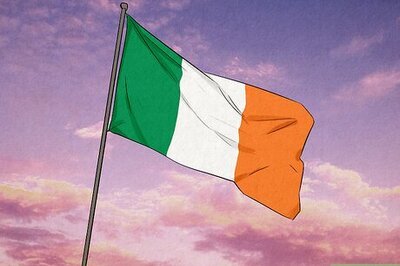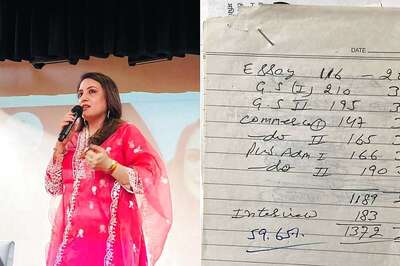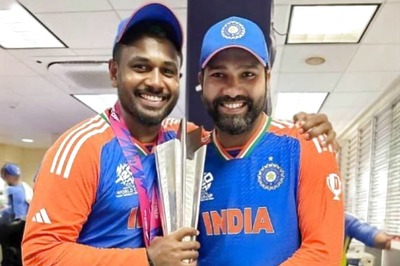
views
Islamabad: Authorities arrested at least 60 more political activists as they extended a nationwide crackdown on Thursday aimed at thwarting plans to head to Pakistan's capital from several cities and surround the country's parliament.
The arrests took place in the southern city of Karachi overnight and outside the high court building on Thursday morning, where scuffles briefly broke out between police and protesters, witnesses and city police chief Waseem Ahmad said.
Pakistan's largest opposition party and two other smaller groupings have joined forces with lawyers demanding an independent judiciary in a protest movement that threatens to weaken the year-old elected government, which the US is counting on to battle Taliban and al-Qaida militants operating in the tribal areas along the border with Afghanistan.
Police rounded up around 300 political activists on Wednesday from cities around the country and banned rallies in two provinces, including Sindh where Karachi is located. Media reports said the government planned to blockade the capital from the weekend to stop protesters entering.
"Our long march will go ahead according to the schedule," said Naeem Qureshi, a prominent lawyer in Karachi, referring to the protest.
He and others lawyers in Karachi were scheduled to leave for the capital Islamabad later Thursday in a motor convoy, where they hope to join thousands of other protesters for a rally at the parliament Monday.
The growing political unrest is raising the spectre of a possible military intervention in a nuclear-armed nation prone to army coups. It could put Washington in a prickly position if the civilian government — which itself rose to power on the back of rallies and marches against former military ruler Pervez Musharraf — keeps clamping down on dissidents.
Human Rights Watch urged Pakistan to free those arrested.
"It's a disgrace for elected officials to mimic the discredited military government by using old and repressive laws to stifle political expression," said a researcher of the group, Ali Dayan Hasan.
Pakistan's lawyers are demanding that President Asif Ali Zardari fulfill a pledge to restore judges removed by Musharraf. Opposition leader Nawaz Sharif, a former prime minister who briefly allied with Zardari during the campaign to force out Musharraf, supports the judges' restoration but also is furious over a Supreme Court decision barring him and his brother from elected office. After the ruling, the federal government dismissed the Punjab provincial administration led by Sharif's brother.
Sharif claims the ruling was politically motivated and has urged Pakistanis to join the protest march.
Zardari, the widower of assassinated former prime minister Benazir Bhutto, has cultivated ties with the US and sought to rally Pakistanis behind the fight with Islamic extremists. Sharif is considered closer to Islamic parties and conservative factions less inclined to support the US war effort.
Worried over the deepening crisis, Zardari is back in Islamabad trying to save his presidency. He's likely to meet with Prime Minister Gilani on Wednesday.
Protesters have pledged a peaceful march, but Sharif has used words like "revolution" and other harsh terms in recent speeches, prompting the government to warn him against committing sedition.
Information Minister Sherry Rehman told reporters the rallies were banned to "avoid bloodshed in the streets." While acknowledging her party had staged similar rallies in the past, she insisted that "we never called to raise the flag of rebellion."
The ruling party has restored most of the judges fired by Musharraf, but a few, including a former Supreme Court chief justice, have not regained their seats.
Zardari is believed to fear that those judges could move to limit his power or reopen corruption cases against him that were dropped by Musharraf when the former general was seeking to forge a political alliance before last year's elections.
State Department spokesman Robert Wood avoided direct criticism of the Pakistani government on Wednesday, but said the US supported "freedom of speech, of expression, of assembly in Pakistan."
Top US diplomats are busy holding meetings with the Pakistani leadership. Washington has said that the parties must resolve their differences in accordance with Pak's constitution.
In New Delhi, External Affairs Minister Pranab Mukherjee said India wanted peace and development in Pakistan.
"We do hope these issues will be resolved by their own said Mukherjee after a meeting of the Cabinet Committee on Security Affairs.
"It is more essential that there is a stable government, responsive and responsible and also a government is in a position to tackle the terrorist activities there and the terrorist activity emanating from Pakistan," he said.
"We want peace, amity and development in all neighbouring countries, particularly in the context of Pakistan," he said
and voiced concern on the terror activity emanating from that country.
He said the developments in Pakistan were an "internal matter" of that country. "But it is for the people of Pakistan and the authorities to decide how they will resolve their own internal problem," Mukherjee said.



















Comments
0 comment